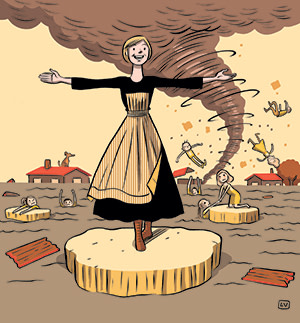How do you solve a problem like ... flooding?


Roula Khalaf, Editor of the FT, selects her favourite stories in this weekly newsletter.
Raindrops on roses and whiskers on kittens; powerless PMs and storm-damaged Britons. Poor old David Cameron is facing criticism for calling out engineers when a New Year’s day power cut interrupted his family’s enjoyment of The Sound of Music.
Some suggest Mr C jumped the queue, putting his own comfort ahead of rain-lashed pensioners and new mothers. I have more sympathy for him: on balance, I think it a good thing that the prime minister has access to his emails. I’m all for politicians understanding the country’s plight but we do not actually lavish luxury on our leaders so a platinum card with Scottish and Southern Energy is a perk I can live with.
More importantly, this was a genuine emergency. He told journalists that the power went off “just before the end” of the film, which means his young children will have been anxious to see whether the von Trapps escaped the Nazis. It is easy to mock Cameron – not least because the problem was, in fact, a blown fuse – but the ability to watch The Sound of Music over the holiday period is surely a fundamental right.
It is, frankly, heartbreaking to think that, thanks to the freak weather, there are still parts of the country without access to Julie Andrews.
Aneurin Bevan once voiced fears of a foreign secretary being sent “naked into the conference chamber”. How much worse, then, for a prime minister to be sent tuneless into the living room.
Of course, it is all down to climate change. That’s why all the news bulletins on global warming always feature an image of an Austrian nun stranded on an ice floe. But the storms and floods lashing large parts of Britain are about more than The Sound of Music. On Monday, the government secretary declared a major incident in parts of Somerset, where some villages have now been denied any big musicals for nearly a month. Even now, RAF helicopters are airlifting emergency stocks of Oklahoma! to the worst hit areas. Not everyone will be so lucky. Some remote areas may have to make do with Seven Brides for Seven Brothers, the heart-warming show based on the rape of the Sabine women.
Happily, villagers are helping each other out. Disaster committees have been formed to ensure that the housebound are visited daily by a youth dressed up as one of the von Trapp children.
The crisis also throws up the wider issue of musical security. If the value of Rodgers and Hammerstein is not instilled in children at an early age, we may lose the genre entirely. We are already approaching crisis point, with 96 per cent of seven to 16-year-olds unable to identify Howard Keel. How long till British kids no longer know the words to “Surrey With the Fringe on Top”? The worry must be that many may even grow up unaware that love is a many-splendoured thing.
For the problem with the classic musicals is that, with only a handful of exceptions (West Side Story, Singin’ in the Rain, Cabaret), they are universally silly. The plots are tissue thin, the acting fairly hammy and even great dance numbers now seem stagey and outdated. What’s more, YouTube has eroded the need to watch a whole musical. Which sane individual would watch the whole of Anchors Aweigh just to see Gene Kelly dancing with Jerry Mouse? There remain some wonderful songs but even these don’t stand the test with a Lady Gaga generation.
No, the only long-term future for these shows is the association that comes with watching them as a child with your parents and associating them with the warm familial embrace.
Without urgent infrastructure upgrades to safeguard our musical heritage, we may be the last generation to worry about losing The Sound of Music. Before long, its loss will no longer be considered a major incident; it will be downgraded to the same status as a temporary disruption to Ramsay’s Kitchen Nightmares.
That, surely, is why the prime ministerial power loss was so urgent and his response so immediate and wise. If even the Cameron clan don’t learn to love the classic musicals, what hope is there for the rest of society?
robert.shrimsley@ft.com; Twitter: @robertshrimsley
Comments